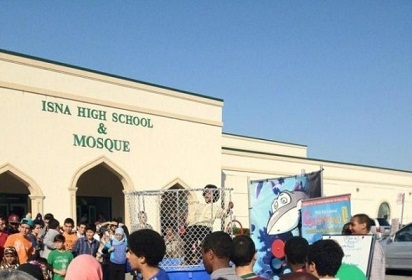Environment preservation has dominated the annual convention of a major Islamic group in Canada in an effort to raise environmental awareness in the Muslim community.
“This theme was chosen to provide an opportunity to reflect on the dramatic changes which took place at ISNA Canada, in Muslim countries and all over the world,” Mohammed Bekkari, President of Islamic Society of North America (ISNA) Canada, told OnIslam.net.
“These changes reflect a new way of thinking and behaving.”
Themed “A New Era Unfolds: Rising to the Challenge”, ISNA held its 38th Annual Convention in Mississauga, Ontario, last week.
The group incorporated a green theme, “Green for ISNA, Green for the Environment”, in the convention to raise environmental awareness among participants.
“Three guiding principles emerged while planning the convention this year: to reduce the amount of garbage we produce, to choose ethically, and to support local initiatives and talent,” organizers said.
‘Green’ features of the convention included recyclable paper cups, plates and reusable products.
To reduce the amount of disposable waste during the gathering, water-filling stations were made easily accessible throughout the main lecture hall to encourage the use of reusable water bottles.
Organizers also supported local artisanship and businesses, and ethical fair trade gifts were selected as tokens of appreciation for the speakers.
“It becomes increasingly important that the balance tips more in favor of conscientious decisions that favor the health of the environment and the well being of the global community,” they said.
“A green, ethical, Muslim footprint could mean all the difference.”
The convention included lectures by a number of well-known, international personalities including Yasmin Mogahed, Mufti Ismail Menk, Dr. Muzammil Siddiqi, Sheikh Bilal Phillips, Dr. Abdullah Hakim Quick, Fazlun Khalid, Elder Cat Criger, Imam Mohammed Magid, Safaa Zarzour, Dr. Katherine Bullock, and Sheikh Salman Al-Nadwi.
Muslims make around 2.8 percent of Canada's 32.8 million population, and Islam is the number one non-Christian faith in the Roman Catholic country.
A recent report from the Washington-based Pew Forum on Religion & Public Life said that Muslims are expected to make up 6.6% of Canada’s total population in 2030.
A recent survey showed that the overwhelming majority of Muslims are proud to be Canadian, and that they are more educated than the general population.
Islam & Environment
Speaking at the event, prominent British Muslim environmental leader Fazlun Khalid called for a review of Islamic educational curriculum to help raise environmental awareness.
“What is it you are telling your students about their connection to Allah’s creation?” Khalid asked the audience.
“We need to instill this consciousness in the hearts and minds of students,” said Khalid, who is the founder and director of the Islamic Foundation for Ecology and Environmental Science based in Birmingham, England.
In September 2009, Khalid was invited by United Nations Secretary General Ban Ki-Moon to participate in the Climate Change Summit in New York City.
His keynote address was entitled “The Environment and the Challenge of the Emerging Order” and was jointly presented with Canadian Aboriginal Elder Cat Criger, a teacher and mentor from the Six Nations People of the Longhouse.
Khalid noted that people have become disconnected from the natural world and urged the audience to draw on the Islamic teachings to restore this connection.
“Islam is inherently environmental,” Khalid said.
“The Qur’an is rich in environmental teachings.”
He proposed an Islamic environmental approach based on four principles: Tawhid (the principle of unity); Fitra (the principle of the natural state); Mizan (the principle of balance); and Khalifa (the principle of responsibility).
Aboriginal Elder Criger reiterated several of the common elements between Islam and the beliefs of the First Nations People.
“We’ve a deep respect for Mother Earth where we all came from,” he said.
“We have to walk and tread very carefully on Mother Earth.”
Elder Criger also spoke of the great care that First Nations People take with the natural resources of the world.
“We are thankful to the plants, animals, trees,” he said. “We only take from the earth what we need.”
By onislam.net



